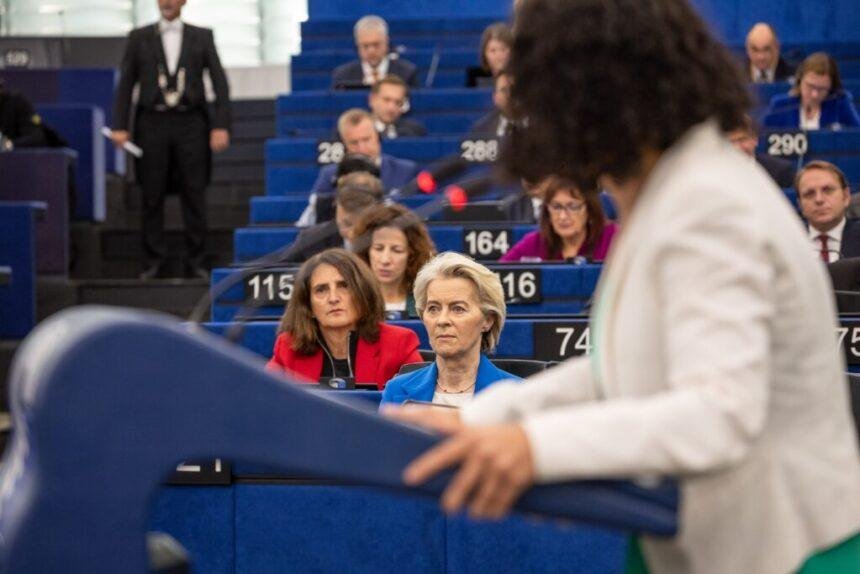European Parliament Faces Divisions Ahead of Confidence Vote for Ursula von der Leyen
As the European Parliament gears up for a crucial confidence vote regarding Ursula von der Leyen, the President of the European Commission, political factions within the assembly are revealing deep-seated divisions. The upcoming vote, set against a backdrop of pressing global issues, has sparked intense debate among various political groups, each with their own perspectives on von der Leyen’s leadership.
Context of the Confidence Vote
Ursula von der Leyen, who has been at the helm of the European Commission since December 2019, is facing scrutiny from multiple angles. The confidence vote comes after a series of challenges, including the ongoing humanitarian crisis in Gaza and the perceived inadequacies in the EU’s climate policies. Critics argue that von der Leyen’s administration has not adequately addressed these pressing issues, leading to calls for her resignation.
In a recent statement, MEP Hayer emphasized that voting in favor of von der Leyen does not equate to satisfaction with her performance. “Since the first motion of censure last July, we can’t say we’ve really made any progress,” he remarked, highlighting the growing discontent among some members of the European Parliament (EP).
The Greens’ Dilemma
The Greens, a significant political faction within the EP, have expressed their dissatisfaction with von der Leyen’s leadership. Co-leader Terry Reintke criticized the European People’s Party (EPP), von der Leyen’s political group, for its indecisiveness and failure to take a firm stance on critical issues. “The EPP is weakening Europe because it is vacillating as to which side of the political spectrum they stand on,” Reintke stated.
Despite their grievances, the Greens have opted not to vote against von der Leyen. Reintke explained, “Do we really, in this crucial moment, want an institutional crisis?” This sentiment reflects a broader concern among various factions about the potential fallout from a leadership vacuum in the EU.
The Right-Wing Perspective
The European Conservatives and Reformists (ECR) find themselves in a complicated position regarding von der Leyen. While many within the group harbor reservations about her leadership, they are also hesitant to align fully with her critics. ECR leader Nicola Procaccini noted that each national delegation within the group would have the autonomy to vote according to their own interests. This decentralized approach could lead to a split vote, reminiscent of the July confidence vote when the Brothers of Italy party supported von der Leyen, while the Polish ECR delegation opted for her removal.
Historical Context and Comparisons
The current political landscape in the European Parliament is reminiscent of past leadership challenges faced by EU officials. For instance, the 2019 vote of no confidence against former Commission President Jean-Claude Juncker highlighted similar divisions among member states. The EU has historically grappled with balancing national interests against collective European goals, a challenge that has only intensified in recent years.
The ongoing geopolitical tensions, particularly in Eastern Europe and the Middle East, have further complicated the EU’s ability to present a united front. The humanitarian crisis in Gaza has drawn sharp criticism from various factions, with many arguing that the EU’s response has been inadequate. This situation has put additional pressure on von der Leyen, as she navigates the complexities of international diplomacy while trying to maintain internal cohesion within the Parliament.
The Broader Implications
The outcome of the confidence vote will have significant implications for the future of the European Commission and the EU as a whole. A vote of confidence could bolster von der Leyen’s position, allowing her to pursue her agenda with renewed vigor. Conversely, a vote of no confidence could trigger a leadership crisis, leading to uncertainty at a time when the EU faces numerous challenges, including economic recovery post-COVID-19 and climate change initiatives.
Moreover, the divisions within the European Parliament reflect broader trends in European politics, where populist and nationalist movements are gaining traction. The ability of traditional parties to maintain unity in the face of these challenges will be crucial for the EU’s future stability.
Conclusion
As the European Parliament prepares for the confidence vote on Ursula von der Leyen, the divisions among political factions underscore the complexities of governance in the EU. With pressing global issues at stake, the outcome of this vote will not only determine von der Leyen’s fate but also shape the future trajectory of the European Union. The coming days will be pivotal as lawmakers weigh their options, balancing national interests with the collective responsibility of leading Europe through turbulent times.











